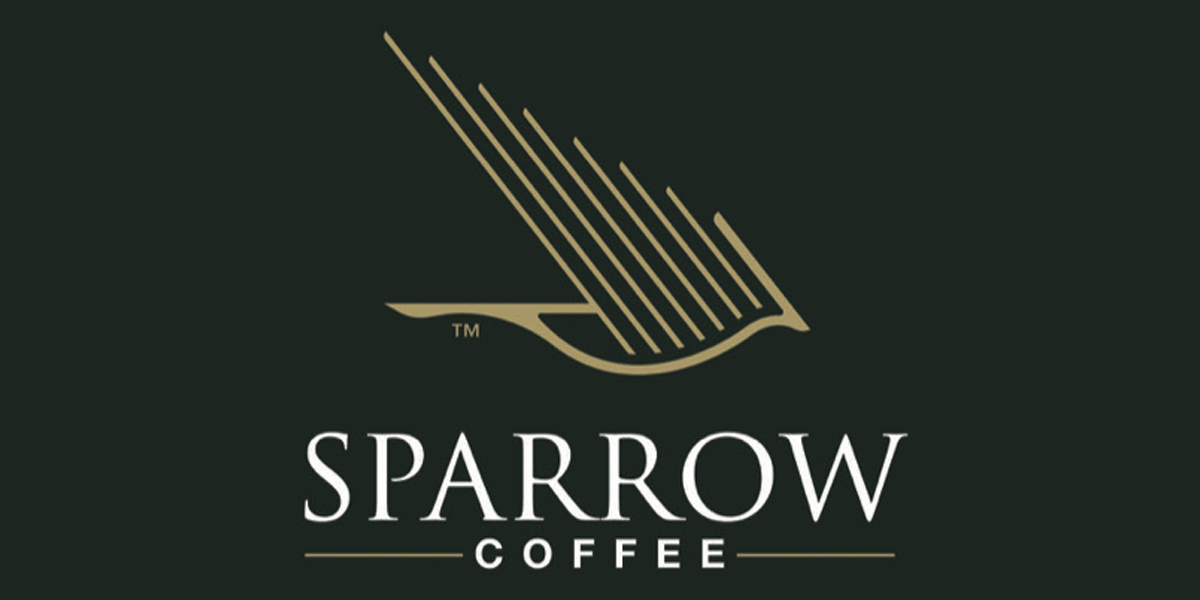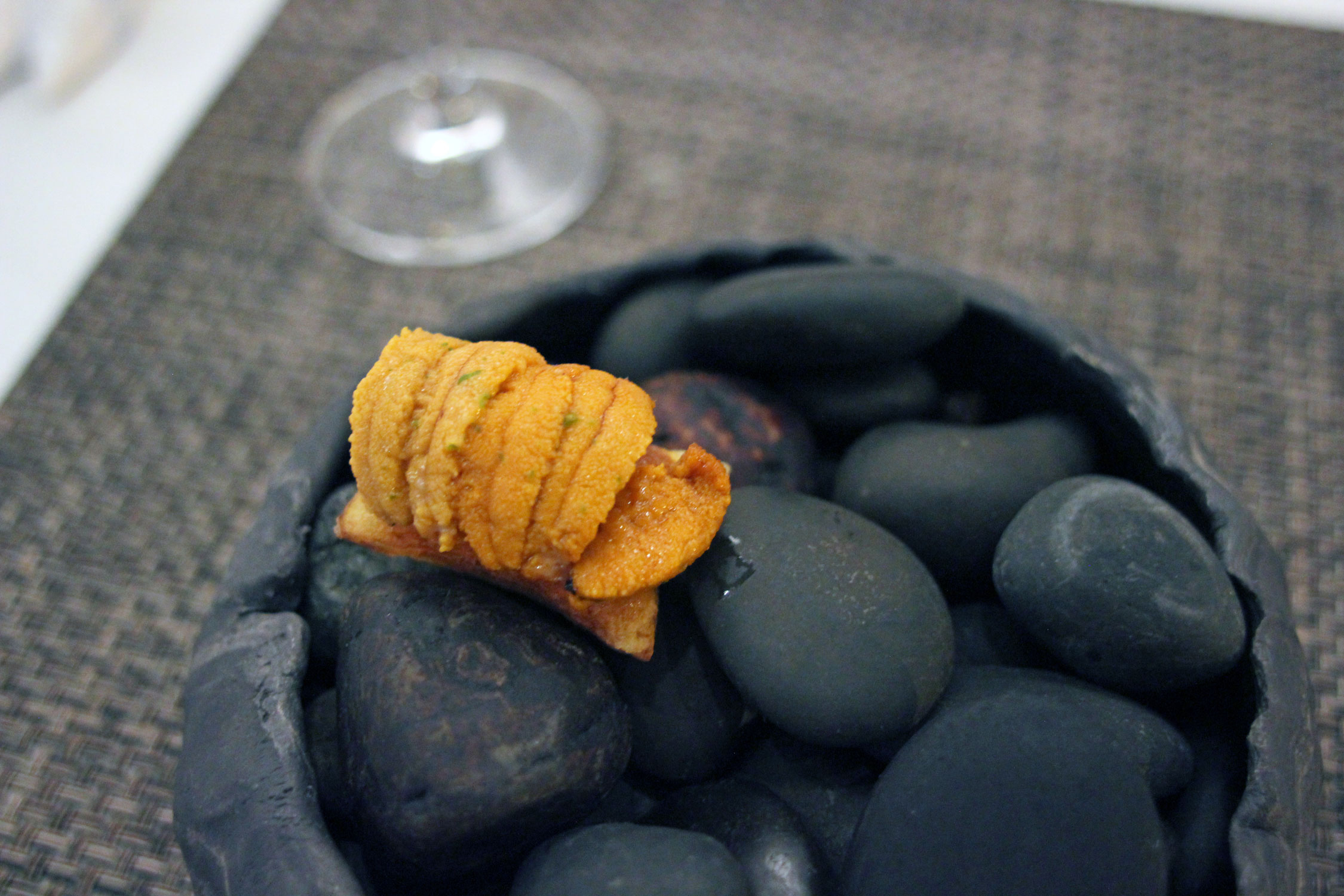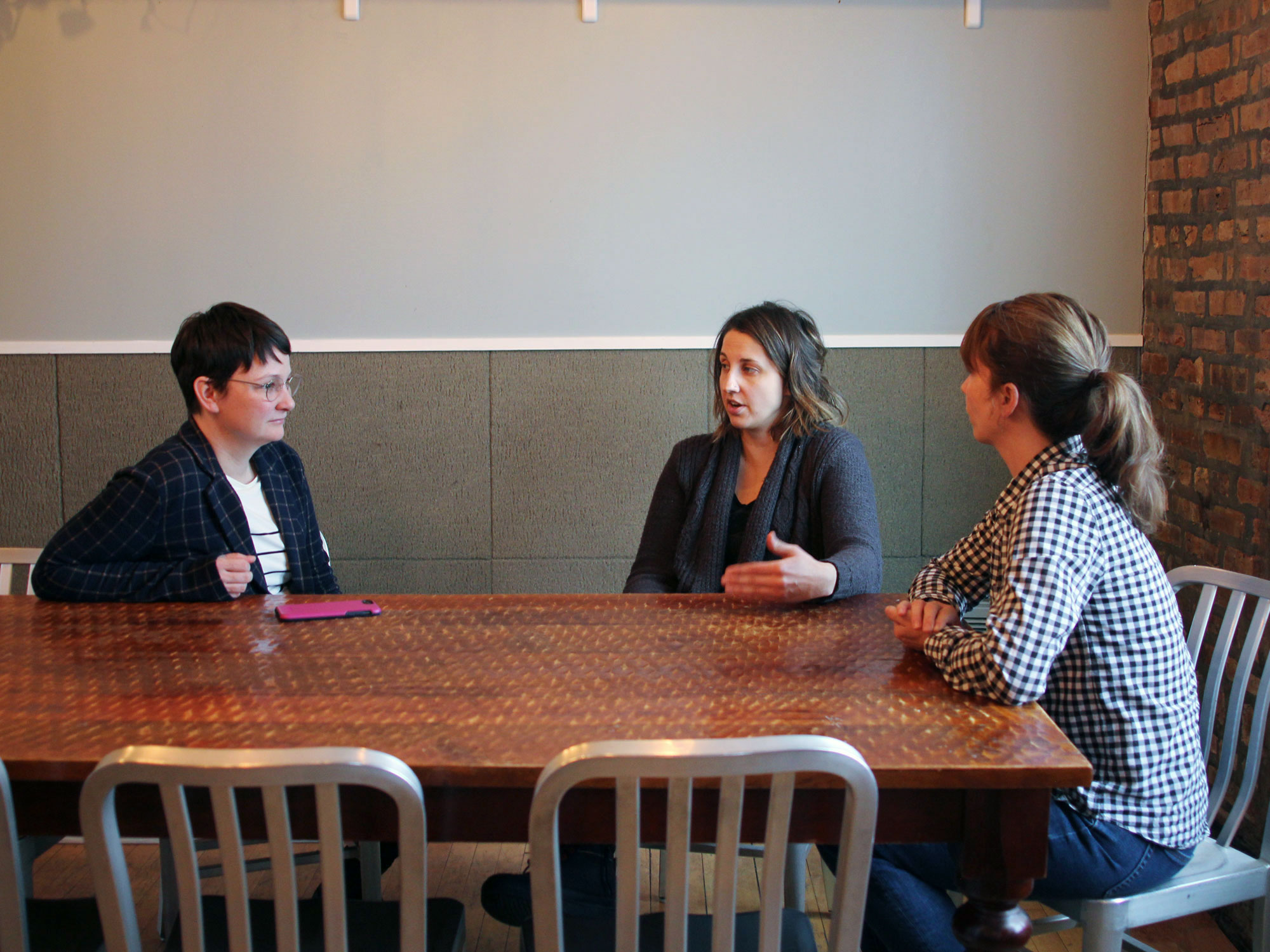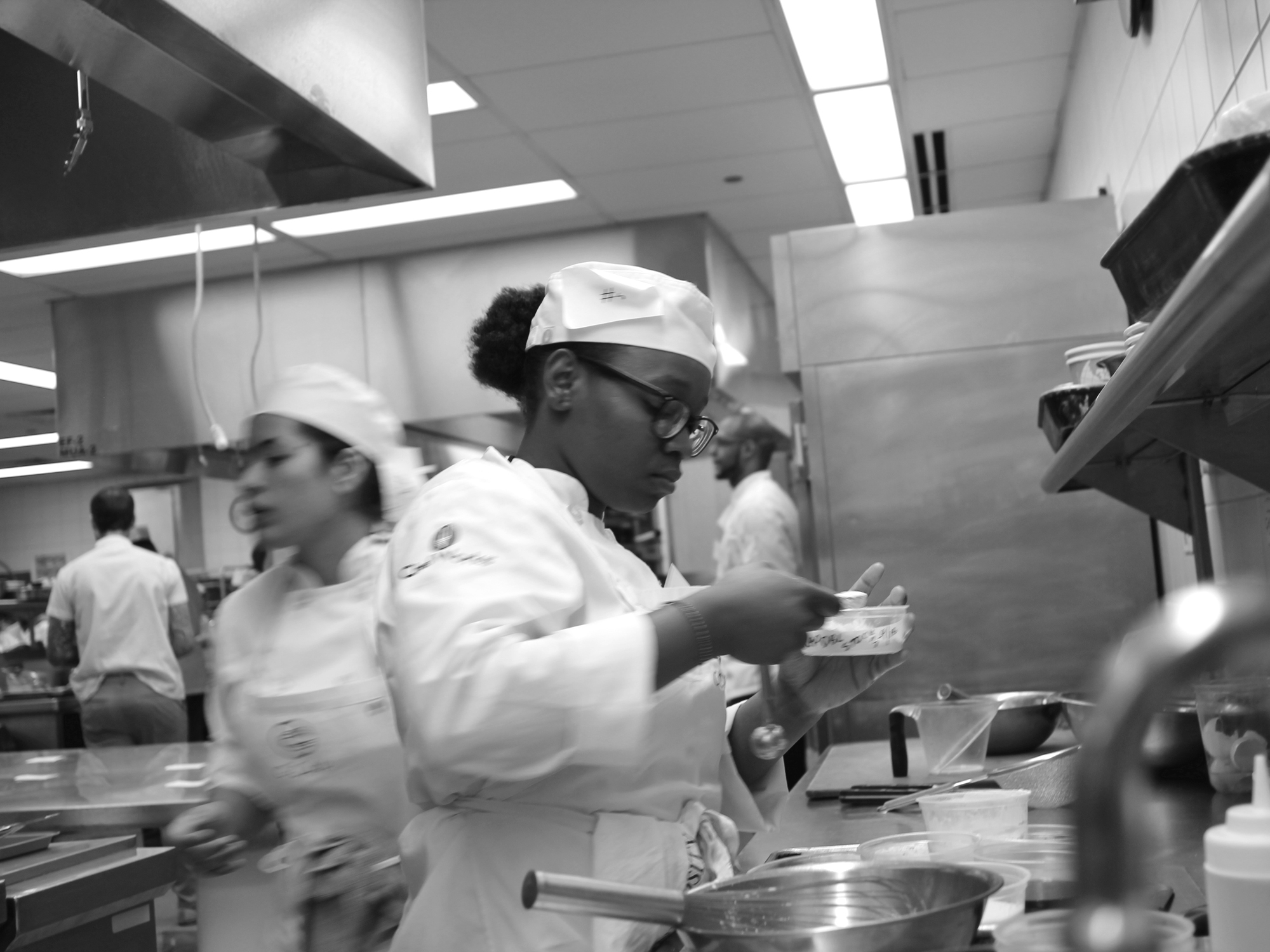IT WAS ONE OF THOSE CORONAVIRUS TIMING stories we all have. I had contacted Erick Williams, chef-owner of Virtue in Hyde Park, about bringing together a group of African-American chefs to talk about the restaurant industry for this year’s Fooditor roundtable, frank talk about life in kitchens. We met one Friday afternoon at Virtue, had a good talk… and then afterwards we chatted about the thing everyone was suddenly talking about, Coronavirus, and how it had affected everyone’s business.
Maya-Camille Broussard, who caters desserts for meetings, said she was seeing a lot of cancellations. (She brought us a couple of pies people had canceled on, to try.) Brian Jupiter had had corporate dinners at Frontier called off, but otherwise his business hadn’t really been affected; the main thing he’d noticed was a surge in applications from people who worked at hotels, which were already suffering as people stopped traveling. But no one really thought it would affect restaurants too much, that Friday, March 13.
Within hours, everything was changing. The next day, Saturday, the heedless behavior of St. Patrick’s Day revelers made it clear drastic action would have to be taken. That Sunday, Mayor Lightfoot ordered restaurants closed by Monday evening, March 16.
Suddenly our discussion about longer-range issues seemed out of place next to the immediate concerns of figuring out a new world defined by social distancing, hand sanitizer, and curbside takeout (which Virtue adopted immediately, very successfully). But as the weeks have gone by, the discussion has shifted from short-term implementation of such things to seeing this time as an opportunity to reform the restaurant industry’s assumptions and dysfunctions… the kinds of things we’d been talking about that last Friday before the world changed. And the fact that Chicago’s African American population has been particularly at risk from the virus goes to the heart of everything that underlies African American life in Chicago—economic disadvantages, segregation, access to healthy food, education and family.
So here’s the conversation we had before Coronavirus—in a sense talking about the world we might make after Coronavirus, even if we didn’t know it at the time. Besides Erick Williams, who was chef at MK for many years and now owns Virtue and co-owns County Barbecue, the chefs who participated were Maya-Camille Broussard, who owns Justice of the Pies, a caterer and (last summer) retailer on the riverfront; Cliff Rome (Peach’s Restaurant and Parkway Ballroom in Bronzeville, and Currency Exchange Cafe in Hyde Park); and Brian Jupiter (Frontier and Ina Mae Tavern in Wicker Park).
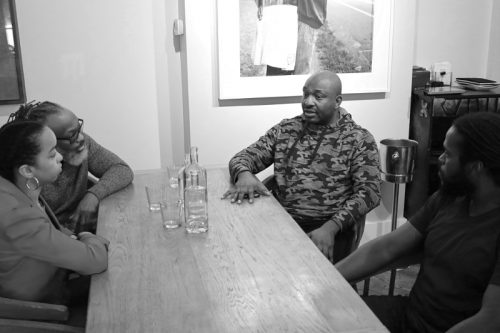
L. to R.: Maya-Camille Broussard, Cliff Rome, Erick Williams, Brian Jupiter
1. Grandma’s Hands
FOODITOR: Let’s start by talking about how each of you got into the industry—because I suspect your paths are quite a bit different from those of white chefs. Chef Rome?
CLIFF ROME: Humble beginnings. I started off as a dishwasher—and I understood that I didn’t want to do that shit for a long time. But I think I was most attracted to the industry because of my grandmother. Like most of us, we grew up in kitchens where your loved one was doing a certain amount of cooking. And for me, it was always my grandmother. I used to stand on this flour can—she just passed away, and my aunt threw it away six months before my grandmother passed—but I used to stand on that flour can, hold onto my grandmother’s apron, and reach over her hip and watch her cook. So for me, that was the love affair.
When I started working in the industry as a dishwasher, I said, “I know how to cook, shit, I cook at home with my grandmother, I know I can cook.” And it just started from there. I was more and more interested in the cuisine—my family’s from New Orleans, and the other part of my family is from Saginaw, Michigan. So between the two grandmothers, we’d spend a summer in New Orleans, we’d spend the other summer in Michigan. So when my grandmother moved from Michigan to Chicago, it just became that. That Southern root—that understanding of cooking—that smell when you walk into the house, especially when you’re getting up on a Sunday—that was just something that was deeply rooted in me.
So when I started working in restaurants, it was like, this is what I’m supposed to be doing.
My first job, actually, was at a hospital, and then I worked at Marriott Corporation. The first actual restaurant I worked at was right here in Hyde Park, Orly’s. So that was my introduction to it, but then I started going to culinary school. I went to Kendall College, and from there it just exploded.
So you were already cooking before you went to culinary school?
Yeah, I was already cooking. Let me back up a little bit. I’m from an area in Chicago called Englewood. There was not a lot of people going to school for culinary—there was a lot of street action. And outside of that, most people weren’t even thinking about foodservice. So for me, a kid from the south side of Chicago, when I started Kendall College, it was in Evanston.
So I’d take the red line all the way to Noyes, almost end of the line for me—it felt like the end of the line! And then I would walk on over, and it was culture shock. The people, the neighborhoods—everything was different. And I’m coming from a community where I used to run down the middle of the street in the morning, because the hope was that no one would come out and stick me up, to this community that’s on the lakefront, beautiful houses, and I’m paying all this money for tuition. That was my introduction to foodservice, what it really was.
MAYA-CAMILLE BROUSSARD: I created Justice of the Pies in memory of my late father. Like Chef Rome, my grandparents came from the South—New Iberia and Lake Charles, Louisiana, Birmingham, Alabama, Georgia, and the Gullah country in South Carolina. So the love of food was always very prominent throughout my family, but my dad especially loved quiches and pies. So that’s why I created this particular business in memory of him.
My first foray into hospitality was owning a bar. I owned a bar with an art gallery in 2009. My inspiration for that was my mom’s father, who owned a bar on 95th and Wentworth called the Esquire. Very similar to, say, Maria’s Packaged Goods—there was a liquor store in the front, a bar in the middle, and then a barbecue juke joint in the back. My mom called that place her after-school program. (Laughter)
She said every day, after school, she went to the bar, sat at the counter and did her homework, with my grandmother as the barkeep. I think I wanted to carry on the legacy of my ancestors, so I had the bar, and when I closed that, I already knew I wanted to start Justice of the Pies. A week before I opened the bar, we had my dad’s funeral. And a cousin came up to me and said, You know what we should do? We should start a foundation to bake pies, in memory of Uncle Steve. And I’m like, I’m opening a bar in a week, I’m at my dad’s funeral, and you want to come talk to me about this?
But after the dust settled with the closing of the bar, I could really think about what I wanted Justice of the Pies to look like. And take the recipes that my cousins and my aunts had taught me, and turn them into what I do today.
BRIAN JUPITER: I grew up cooking. I started cooking with my grandmother when I was young, 10 or 12 years old. And she took me to a cooking class, at the New Orleans School of Cooking, in the French Quarter. And that was my first interaction with a chef. That kind of set me on my path of, okay, I want to get better at this.
All throughout high school, I cooked a lot for my peers, and got feedback that way—my food critics were all my boys. Right before I started my junior year, a kid that I went to school with worked at a restaurant on the Westbank, called Aurora Steakhouse. He was a busser, but he knew that I cooked, and he was like, my parents’ friends own this restaurant, and if you want a job, they’re looking for a cook. I started working there after school as a fry cook, and that sort of let me know what a professional kitchen was like. As small and kind of mom and pop as this place was, it was busy, and it was an environment where you were responsible for your station. They didn’t cut me any slack because I was so young.
My mother would talk to her friends over the phone, and she’d say I’m about to cook, and they’d say what are you cooking, and she’d say I’m frying chicken, and within an hour they’d all be at our house.
So I started looking at culinary schools, and I picked Johnson & Wales and moved to Miami after I got done with high school. I worked my entire time down there, and I always felt like working in it was going to propel me a lot faster than just the schooling in it. I jumped around, all different types of cuisines, quit a place and go work somewhere else—it was strategic, in a sense, because I just wanted to soak it all in. And then I got a call from a chef I’d worked for to move to Chicago for a restaurant called Narcisse.
The deal they had kind of fell apart, and he left. I was young, like 22, and I went to the guys and said, Look, I didn’t move here to work for somebody I didn’t know. I told them I wanted to be the executive chef. So they thought about it for a little bit, and they gave me the shot. I’ve never looked back.
ROME: I didn’t know you started at Narcisse, I loved Narcisse. It was a champagne bar—
JUPITER: And I knew nothing about champagne, I knew nothing about caviar. I think maybe I’d had caviar once in culinary school, and I was coming to run a place that was all about caviar. But that was the challenge. I wasn’t ready for the job, so I had to make sure no one knew that. And I didn’t know anything about the food that I was supposed to be serving, so I had to make sure no one knew that. So there were a lot of nights of studying, that made me ready to handle it.
It was a restaurant, and it was a nightclub—there were subwoofers under every booth. They were flying DJs in from London, and when they would get these DJs in and turn it up, the bar next to us, the bottles would start falling off the bar. So we had to tell ’em, yo y’all, take them off the top shelf.
ROME: I took a menu from there, you’re going to trip when you see it. There was some cool shit on the menu, I didn’t know you were the chef. Wow.
ERICK WILLIAMS: My life’s a little simpler than these superstars over here. I didn’t want to be in restaurants. I tried to work in a Burger King when I was a kid, and they wouldn’t hire me. I don’t know why, but they wouldn’t hire me. So I wasn’t excited about restaurant life because that would have been my first job, and they denied me that experience.
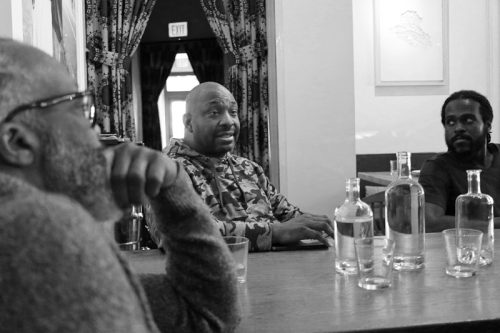
Like my friends here, I grew up watching my grandmother cook—I didn’t cook with my grandmother. I took a lot of joy in being able to prepare food for myself. You try to find your identity as a kid—you want an edge. So the kids who play sports have an edge. If you grow up in the era of lighter-skinned singers, you have an edge if you’re light-skinned. At that age, I didn’t really feel like I had an edge. I was a little chubby kid who played a little bit of football, but I didn’t really have an edge. But I could cook, so that was my in, because a lot of my friends’ parents didn’t let them near their stoves.
I didn’t know my mother was a really good cook; I didn’t know until well into my thirties that my mother fried chicken really well, until I started thinking about the fact that, back then, you didn’t have company on school nights. People weren’t allowed to linger in your home. If company was around it was Friday night, Saturday night, early Sunday, like after church. Monday through Thursday, if somebody came to your house, it was a counseling session. Like somebody had lost their job, or needed to borrow money.
Yet Wednesday, our house would be full. It was because there were certain nights that my mother wanted to cook chicken, and she’d talk to her friends over the phone, and she’d say things like “I’m about to cook,” and they’d say what are you cooking, and she’d say I’m frying chicken, and within an hour, they’d literally all be at our house. I’d be like, great, I get to stay up late, but I didn’t understand the parallel between fried chicken and visits. Somewhere around my thirties, well into chefdom, I started running into my mother’s friends, and they’d say, your mother could really fry chicken.
So it was access to those recipes and those techniques through my grandmother and through my mother. But I still didn’t want to cook. If it was up to me I would have went into real estate. I thought restaurant jobs were a means to an end.
I got my first restaurant job contrary to what our parents taught us—my mother used to say “If you want a job you have to go out and look for it. You can’t get a job sitting on your ass.” And a friend of mine rang the doorbell one day and said, “If you go over there, they’re hiring.” I said, “You gonna work there too?” and he said “No, I actually just quit, but I told them, I’m gonna replace myself, and you could do this.” And I figured, I’ll go and at least appease the powers that be, being my parents—at least if I go and I suck at it, then I can say I tried. And I’ve been in restaurants, and never missed a paycheck, since.
From that space, I worked at a restaurant down the street, and these guys laid me off, and I was walking down the street back when Sony had headphones, and listening to a cassette tape. I pass a guy sweeping out front and a voice says in my head, I should see if they’re hiring. And I look at the guy, and I think, he doesn’t know, and I keep walking. I hear the voice again, and I turn around, and I look back at the guy, and I think the same thing and I keep walking. I get to the corner, and I hear the voice a third time, and I decide to turn around and ask the guy if they’re hiring. And he says, sure, I’ll go get my boss, and the guy was Paul Larson who runs Blue Plate Catering now, and the place was the Hudson Club.
When I met Michael Kornick [MK], he talked to me for an hour about basketball and hand to eye coordination. He told me, he sensed that I wasn’t a good cook, I was just in restaurants. He stated to me that if I had good hand to eye coordination, and I understood the difference between offense and defense in basketball, and the importance of recovering the ball, he would use my hand to eye coordination to teach me how to be a good cook. And I’ve never looked back.
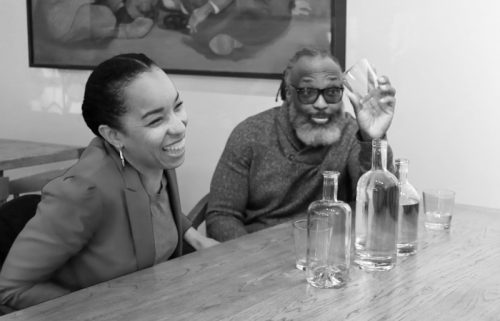
2. They Smile In Your Face
FOODITOR: Let’s talk about restaurant culture. A lot of people say about Chicago restaurants, they’re white in the front and Mexican in the back. So where did you, as a black cook, fit into that?
WILLIAMS: We didn’t. We always stood out.
ROME: Always was the only black person. Always the only black person, in every kitchen.
Except—I got a job with Wolfgang Puck in like ’94, ’95. This story is hilarious to me, because I didn’t know who the executive chef was, except that he was black. It was François Kwaku-Dongo [of Spago in Los Angeles]. I go in for an internship, and as soon as I hit the front door, they say, we’re not hiring. I said, well, Ms. Puck told me to come. I didn’t know who Ms. Puck was, but I figured Wolfgang must have a wife, right? So they say, oh, Amanda, she’s in the back.
So I go around to the back and before I can reach the kitchen manager, I see a guy who says, “C’mon over here, fill out an application.” I hear this guy coming down the stairs, he had this really thick accent and all of a sudden, everyone’s standing up straight. He turns the corner and I go, “Ah, you’re a brother, heyyyyy!” And he looks at me and goes, “Who are you? What are you doing?” I said “Hey chef, my name—” And before I could finish he says “Get out of here, we’re not hiring.”
So I’m turning around and I hear another guy coming down the stairs, and I can’t understand his accent either. It’s Wolfgang. He says “‘Ello, what are you doing here?” I say I’m here to fill out— He says, “Can you peel potatoes?” I say, yes sir. He tells me to go peel potatoes. So the guy sends me upstairs, gives me a chef’s jacket, I run back downstairs, and I start peeling potatoes.
One hour, two hours, three hours. Four hours later, Wolfgang says, “How are your fingers? You still have them all?” I say yes. He says, “Bring this guy back tomorrow.” So that’s how I started with Wolfgang, but when I looked around the kitchen, the only person who looked like me was François, and I had zero idea that he was the boss, they had brought him in from L.A. to open Spago Chicago. But there’s a hundred people in the kitchen, and there’s two black people.
JUPITER: In New Orleans you had more blacks in kitchens. In Miami you had a lot of the islanders—Haitians and Jamaicans, stuff like that. That part of my career, I always had a little more color with me. The higher-end restaurants that I worked in, that’s where you were the only guy, the only black on the staff in the back of the house. You feared sabotage and shit like that, because it’s fine dining and demand is so high, everyone’s trying to kiss the ass of the sous chef and the executive chef.
I always knew that I was going to run my own places anyway. And so, I looked at everything as a temporary move, a knowledge grab, learn it and get out of here, because the goal is to have my own. I got somewhat lucky that I did get an early break to run my own kitchen, so I set up who I hired. For the last 15 years, I’ve had the ability to hire who I wanted, with no one telling that they had to look a certain way.
There’s a hundred people in the kitchen, and there’s two black people.
I had a chef come to me about a year ago, he had been in fine dining restaurants only, and he was like, do you ever get discouraged, being black and a chef, working in these kitchens? And he was ready to call it quits. I said, look, maybe you need to change the environment that you’re putting yourself in. If you’re trying not to stand out, but you only go to these high end neighborhoods, with mansions and millionaires, then… you’re gonna stand out.
Literally two days after I talked to him, a guy that owns a black-owned restaurant, was looking for a black chef. I linked the two, they start working together, and it kind of revitalized his career. Because it put him in a spot where, now you’re in charge of setting that tone and that environment that you’re in. I think that’s important, for us to be bosses.
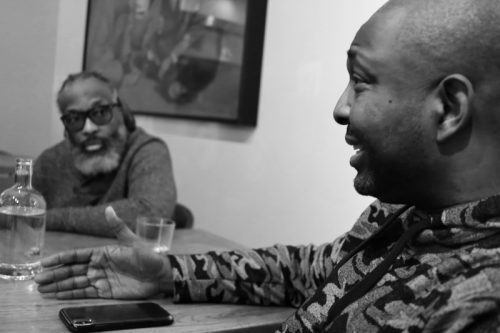
3. Grits Ain’t Groceries, Eggs Ain’t Poultry
That brings me to a challenge you all must face at times. You don’t want to be limited out of being able to do high-end dining, treating it like it’s “white food” or anything like that—you want to show you can cook anything. But at the same time, you want to reflect where you came from in some way. So it’s a conflict between being true to yourself, but not wanting to limit yourself.
Erick, Virtue is certainly more rooted in black heritage than what you cooked at MK was. How do you wrestle with that?
WILLIAMS: Somewhere in the time that I decided that this could really work for me, that I could be really good at this, and that I really wanted to compete in this arena, I was trying to find purpose, I was trying to find what my place was in kitchens. Where my voice was going to have the most resounding sound.
So I met with my father. And he started talking about music, because he sensed how all over the place I was in my thinking. And he said to me, look, all musicians want to go out and do jam sessions. Everybody with an instrument is excited about doing a jam session. But the best improvisation comes from people who really understand the standards. If you don’t understand the standards, you don’t leave a trail—you’re just playing a bunch of notes, there’s nothing anybody can follow.
I thought that was pretty provocative when he told me that. And it came full circle for me a few years ago, with Kerry James Marshall being recognized as one of the most important African-American painters of our time. There’s a video where he talks about mastery, and how, as a young painter, there were no images of African-Americans to paint. There weren’t many people for him to ask for tips as he wanted to hone in on that particular skill set. So he was going to master the platform that was given to him, which was the art of painting white figures. And once he mastered that, and people recognized that he was the best in that category, then he’d be able to do whatever the hell he wanted to do. Hence the fact that his show was named “Mastery,” and it showed 40 years of his work.
A lot of that was happening as we were thinking about a need in our community—a need for someone who looked like me to be able to speak intelligently about what our food means, about what the relationships in this community mean to us, and what service that provides—merely to our team. That’s before you get to guest facing. My chef de cuisine and I watched this video of Kerry talking, and immediately we were like, that’s it. That’s it.
What’s it?
That I’ve been doing this long enough, and at a high enough level, to do whatever the hell I want to do. So the food that I never thought about cooking—Southern food, because it was so common—was the food that now, I was going to cook. And cook in a way that showed respect, and homage, to our ancestry. That provided space for our culture. The door’s open, anybody that wants to walk in. But this place is unapologetically black. The art’s black, the people that are serving you are black, the people that are cooking are black, the people that run the place, own the place, and the investors are black.
They’re people that encourage the idea that there aren’t many spaces like this—or spaces like Ina Mae’s, or spaces like Peach’s—or many people making pies with “justice” as the first name. In the African-American community, you know, justice means something different to us. “Just us.” Right? We’re the only ones that are being prosecuted—”just us.” All the rules apply to “just us.”
The art’s black, the people that are serving you are black, the people that are cooking are black, the people that run the place, own the place, and the investors are black.
So the commonality here is, I think, that we don’t battle this space. We embrace it. And we embrace it in a way that makes it a lot more palatable for people that don’t look like us. But for folk that do look like us, it carves a clear path to how you become successful in a way that is dignified, first and foremost, but also that amplifies the fact that you will not get here unless you plan on working your ass off. And it doesn’t matter what color you are.
BROUSSARD: One of the things that I can appreciate is setting the standard, and mastery. Because one of the first thoughts that came to my mind is that growing up, I was a professional dancer. And you have to learn ballet before you can learn jazz, because there’s elements in jazz that you can only get from ballet.
But when I started Justice of the Pies, especially coming from a very Southern family, a deep South family, I knew that I had to master the classics before I could go crazy with the innovation. When I started the business, I knew that I had to please somebody’s Grandma. When I made the sweet potato pie and I’m at the farmer’s market and the old lady is asking me “Does it have any strings in it?”, I mean… they don’t play. So I really had to make sure that the Southern classics were on point. And then I could play with the flavor profile.
The ones that you brought us—blueberry banana cream pie and strawberry basil key lime pie—one is pretty much straight down the Southern comfort food alley, and the other one is more radical.
I do a classic key lime pie, which is very Southern, like Miami, Key West, what have you. But I knew that if I embarked on this business, I had to be loud. As a black woman, as a black person living with a disability, I know that my innovation has to be three times what other peoples’ is. That’s the challenge when you are a person of color and you want to be seen—there’s going out of the box, and then there’s really going outside of the box.
Brian, you’re working within something that’s kind of its own genre, Louisiana cuisine. Was that easier for you, or do you feel it kind of limited you?
JUPITER: You mean, like now with Ina Mae Tavern?
Right. I guess you came back to it, after cooking many different kinds of things.
Yeah, I mean I worked in places that were so far from Louisiana food. I worked in higher-end Japanese, and some steakhouse type of settings, in Miami. I was still trying to find myself as chef, figuring out what kind of food inspired me the most. And at the end of the day, I was kind of bringing it back to what I knew, what I grew up having, the things that made me feel at home, and creating derivatives off of that.
Frontier was a concept that was created by the way the space looked, and the menu was created with stuff that I had never cooked before.
Yeah (laughs). People always think because of Frontier, “Oh, he grew up eating these wild things,” and I let ’em go with it because it’s a better story. I like the challenge of creating dishes with something I’ve never made before, because I like the way it reads. And then I have the confidence that I can make it taste good.
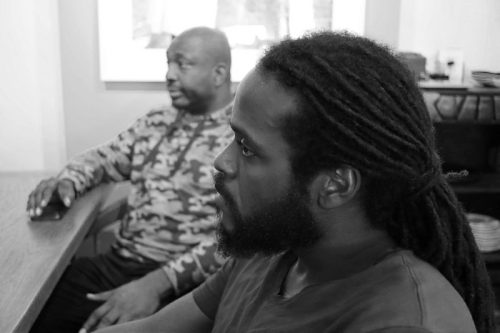
Louisiana food was always in me, but through the years, I kept it as a component, but never in the forefront until Ina Mae.
Cliff, your restaurants are on the south side of Chicago. So do you feel serving soul food is something that was just natural for the audience in the locations you’re in, or did you decide to return to it at a certain point?
ROME: I spent a significant amount of time in fine dining. I was having rosewater martinis in Provence, right? (laughs) I think about bringing it back to the south side—I don’t know what I was thinking, why did I come back to Chicago?
For me, it was really about the historical significance of the south side. In particular, Bronzeville. Bronzeville was an area that my grandmother spent a whole lot of time helping to cultivate. From the speakeasies, to ballet. Because in the 30s and the 40s, black folks couldn’t go downtown. So all the activities happened in Bronzeville. She used to tell me stories about Bronzeville, and what it meant—”Harlem, nothin’, I’m talking about Bronzeville,” the Black Belt. Black Metropolis.
And so I would find myself driving up and down King Drive, wondering, Damn, I wonder what that was like back in the day. I had no idea, zero idea, that I would wind up at 45th and King Drive, in a building that she was at, that opened up New Year’s Eve, 1945, with Duke Ellington and Cab Calloway, Nat “King” Cole on the piano.
So for me to have that connection to my grandmother, around a community that meant so much for black folks, was crazy. It was a natural transition to open a restaurant. We own the Parkway Ballroom at 45th and King Drive, and that institution means so much to black people, especially of a certain age. There was a business downstairs called Metropolitan Assurance, and then there was a funeral home right next door. So the idea was that they could sell you insurance, let you party till you die, and then they could bury you next door!
We’ve acquired all those spaces, so you have the historic Parkway Ballroom. We built an art gallery next door, called Blanc, in that funeral complex, and we spilled out into a courtyard, to be able to house the events, indoor or outdoor. So the restaurants just became a thing of corners, right? We wanted to be part of the cornerstone of what was happening in Bronzeville.
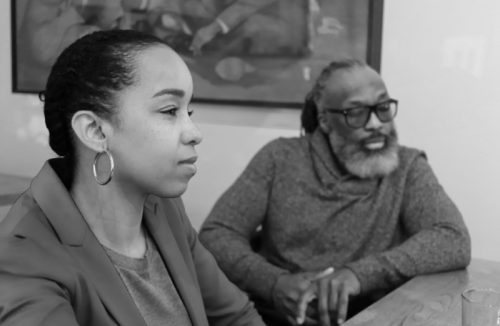
4. The Makings of You
Tell me about mentoring the next bunch—the kids who work for you. How do you approach that, what do you look for, how do you put somebody on the path to follow you?
ROME: I’m going to start. You know what I dream about, and it’s a vivid dream. Waking up, working in the world, with people who are deeply passionate about what they do. If that happens, with people who are deeply curious about what’s around the corner—in a good way—that’s when you open the floodgates. Because the thing about talent is, the more you use it, the more you get.
Once you find that person, you just unload—sometimes we overload. Because you’re excited to see and to find people that are just a little bit more passionate about the industry than the next person. So that’s where it kind of starts. I think we all are still looking for those people. Because you can’t tell me, as long as we’ve all been in the business, that we only get one. With all the stuff that we have to offer, you’re waiting on them to line up. Not to kiss the ring, but to get the knowledge. Because they’re not giving that shit away any more—I don’t think people ever gave it away, it was called sweat equity.
I really feel like if I find those people, or that person, that I’ll just keep at ’em, every day, every day. Mentorship is a crazy thing and not a lot of us have them. I would get up very early, every morning, to follow my mentor, like a kid—and I was a grown-ass man. I would bring coffee, when everyone else had coffee I would bring doughnuts, because I was a little more curious around, how did all this shit happen? I stuck with him every single day—and I can’t even get a person to get out of the bed on time. So when I find that one, I’m always drawn to them.
BROUSSARD: My mentorship looks a little differently. I do have the classic mentor relationship with students from the Impact Culinary program, because they’re right across the hall from my kitchen at The Hatchery. I’ll have some great kids come in and work for me for a short time. But one of the things I’m passionate about is fighting food insecurities. That’s mainly because my dad grew up in the projects, and my grandfather was an alcoholic who would buy everybody in the bar a drink instead of buying his kids food. That trauma was passed down to me, and so the way that I ate at my dad’s house was bad, and I have serious food issues about sharing food. And I’m not going to put anything in my mouth unless it’s really good, because I’ve had so much bad stuff.
So one of the things I focus on is mentoring kids in the fifth through eighth grades about basic kitchen skills, nutritional development, eating well. Like—you can make eggs. This is a fun way to make eggs, and these are the seasonings you can put in eggs, jazz it up. Because I think its important to eat well. And when you eat better you’re able to be more successful because you’re more alert in the classroom.
Often all kids have in their neighborhood is the corner store. They get snacks and overprocessed food and things that are not good for them. But if you give them the opportunity, they can make the right choices when it comes to food. I took a group of kids to Whole Foods, and I gave each one of them a $50 gift certificate. And I was just so proud at the food that they picked out. I didn’t tell them to do it, they did that. And it’s because they finally had access.
It seems like that’s something that stands in the way of a lot of kids starting in kitchens—they just don’t have wide experience of food. Not that any teenagers do, really, but you can’t cook it if you’ve never even heard of it.
WILLIAMS: Well, that’s not exactly true. I started in kitchens, I didn’t know what the hell I was doing. Very similar to what Jupiter said, the goal was to not let people know how little I knew. I kept my mouth shut, I kept my head down, and people that knew me when I started in kitchens can’t believe I talk as much as I do. I actually have something to say now. But I didn’t have a whole lot to say because the topic was foreign.
The part that’s missed in mentorship, instruction, training is, people don’t know how to listen. Cooking is a series of repetitive acts where you follow instructions, and if you can listen, you can follow instructions. I could show you gardens and gardens of the best produce, and blow your mind at some of the flavors. You can’t do anything with them if you don’t know what to do with them. You don’t know how to plant them—you may not know how to eat them. Think if we were all foreign to uni, and somebody gave us that shit. Right? I mean, chefs that work with uni don’t know how to get the eggs out of uni!
We didn’t eat anything that wasn’t cooked. Raw food? Are you kiddin’ me? You gotta cook all the ghosts outta that.
It’s all about being able to take in information, process, and execute. Yes, you become that much more intrigued, when you have access to things. Your senses are activated, when you taste certain flavors or you smell the aromas of certain things. But I would beg to differ, because let me tell you, I can’t eat liver. I’ve never been able to eat calves’ liver. And I can cook the shit out of some liver. But I just legitimately cannot eat it—I get to that iron taste at the end of the bite and my body rejects it.
JUPITER: Man, I love that stuff. (laughs)
WILLIAMS: Right? Chicken liver, because it’s got a lot of cream and mousse, I can take that down. And it’s just part of who we are—in our culture, and in the Jewish culture, there are fond memories of liver experiences. They can talk hours and hours—Jewish people talk about liver and ketchup, we talk about liver and onions.
ROME: Onions, and gravy, and white rice.
WILLIAMS: And white rice. Not to cut across anybody, my perspective is a little different, but I really did not know my behind from a hole in the wall when I walked into kitchens. And everything—everything—was foreign to me. Because we didn’t eat anything that wasn’t cooked. Raw food? Are you kiddin’ me? You gotta cook all the ghosts outta that. If there’s a little bit of juice there, cook—that—juice—OUT. And then we will add juice in the form of A-1 to a steak—
(Laughter)
—ketchup to a burger, mustard to a sausage—literally, juiceless product. And if you thought that it was slightly undercooked, then you grabbed that big metal spatula, and you pressed it to make sure that there were no forms of blood, or anything that would exude moisture from a piece of meat.
That’s what I was taught. That’s what I was exposed to. But the restaurant world was like, nah, man. I remember the first time my boss taught me about steak, and understanding temperatures. And he said to me, I eat medium rare steak because that’s what I was exposed to, and I’ve learned to love it. I would argue that, if most people were blind, they would eat steak medium. Because it’s the perfect temperature for a steak, because the heat gets high enough to break down the muscles, or the connective tissue, in the steak, but it’s just low enough where there’s still juice and the flavor of the steak.
Just to sidebar on steak for a second—I worked at a restaurant that sold a lot of steak. We went through mad cow’s disease, we went through everything that could affect meat. We never sold one less steak. But that’s probably more a little bit more than you wanted.
Well, we traveled a bit from the point about mentoring. Brian, do you want to talk about that?
JUPITER: I think it’s important, and we talk about it a lot because we employ so many African-American people. The opportunity has to be there. And if I’m giving you the opportunity, what I’m requiring you to bring back is some form of drive, and punctuality. The skill set of cooking part, I put that at the very end. You know, I have sixteen-year-olds that work for me that are working stations, that are responsible for setting up and cleaning up their stations, and I want to set them up to be able to decide whether they want to go to culinary school or not.
But they don’t have to go to culinary school. Because culinary school, to me, doesn’t set you up for success. Get in a hole financially, you still don’t know enough, you’re not going to make that much money—it’s one of the reasons we’re struggling to find cooks now. So when I have these kids that are 16, 17, they work with me for a couple of years, they pick a restaurant, I set them up, they’re in—they’re ready to go.
So the importance of that professionalism—that’s why I like that Impact Culinary program, they’re teaching it all. When we grow up in environments where we don’t have professionals surrounding us, whether that’s mom, dad, aunt, uncle or whatever, we can’t pull from experiences. So I get all kind of shit. Every excuse you could ever imagine, I’m Ubering people, paying for bus fares and stuff like that. But, at the end of the day, some of that responsibility to teach them how to be professionals lies on us, because we’re in the spot to give them an opportunity. I don’t owe anyone shit, but I know that if I didn’t do that part, I would feel a little bit incomplete.
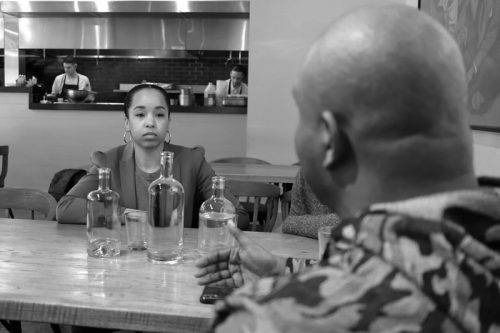
5. I’m The One Who Beat You At Your Game
What about starting businesses? Someone earlier mentioned the importance of black people being bosses. Obviously, the African-American community has less access to capital, less history of businesses spawning other businesses compared to things like, say, the Greek community, which has a history of setting up restaurants generation after generation. How do you get more of that in the black community?
WILLIAMS: We’re still suffering from the effects of slavery. That’s what the situation is. The reality is, a large proportion of African Americans grew up in homes where finance is not discussed in a way that leads to business opportunities. It’s often discussed in terms of what people have, in terms of who we owe, and it’s often talked about in terms of saving. But we don’t know what the hell we’re saving for. We just know it’s for a rainy day, you know?
So we don’t talk about the “risk factor.” The kid that walks out the door, and decides that he’s willing to risk his life, because he’s got nothing to look forward to. And that doesn’t just happen in the African-American community, it happens for most 16, 17, 18 year olds, because at that age you haven’t lived enough life to measure what life really means. The same reason why the military picks people so young. Nobody in their right mind would want to be on the front line of a battle, and not even know what they’re fighting for. But the person with a full family is thinking twice. They may get on the front line because they want to protect their family at home. But a kid doesn’t have that much.
So you’ve got these young kids that are making life choices at very young ages, to go out and do whatever they do to break the law. Which gives them a very high risk tolerance, but without adequate information. So the same kid, who on one block decides to sell drugs, could be two blocks over with a lemonade stand. Same kid who decides that he’s going to go steal gym shoes, not so he can wear them but so he can sell them and bring some extra money home, could create a platform and sell gym shoes online.
But that information is coveted, and talked about in closed rooms. So there aren’t opportunities for people to have these discussions, and talk openly about the benefits of starting businesses, but also the hardships of navigating a business. Because there was a lot of ownership of African-American businesses, but as storefronts got burned out in riots, and as matriarchs and patriarchs died, the information wasn’t translated down to second and third generations.
Other ethnic groups are doing a really good job of transferring that information. Because if you’re not in business, how in the hell can you even keep up with all the acronyms? ROI? P&L, what’s that?
BROUSSARD: Peaches and lemons.
WILLIAMS: Right! I did a pitch for this concept to a group of attorneys, and I was on the elevator with one of them afterwards and he said, hey, I was a little embarrassed to ask this in the meeting, but you talk a lot about P&L. Do you mind if I ask you what that is?
And I’m like, I haven’t gone to enough classes to talk to you as an attorney about what a P&L statement is. But just think about it. This is a guy who went to school in a very structured environment, and he works for a very powerful firm. But he doesn’t have to talk about a P&L statement. All he has to do is produce a certain amount of results. And when you think about it in that context, that’s the story of the African-American experience. If you work for McDonald’s, you work for a very large firm. But you don’t understand the P&L statement, or the financials of French fries. If you had a business that sold potatoes to McDonald’s, or sold packaging, or straws, you’d be set for the next three generations. But that’s not a conversation that is often had with people who look like us.
BROUSSARD: My grandparents, the same ones that owned the Esquire, did not graduate from high school. But they collectively got together with other black entrepreneurs to open a series of motels along Stony Island. And my grandfather owned one of the first black nursery schools on Chicago’s south side. So they had an understanding that we’re disenfranchised. But the way that we could be stronger is stronger together. So we need to link up with other black people, who also migrated from the South and who are also having a hard time getting in. They don’t have any allies. There’s nobody saying hey, he’s a good guy. Or, they have a good idea, we should support them and put our money behind them.
So their idea was, we’re going to collectively do it ourselves. We’re going to take on five jobs, driving a taxi cab, driving a dump truck to fill in Lake Michigan, working for Com Ed because everybody’s parents worked for Com Ed—
ROME: Or the Post Office—
BROUSSARD: I have three jobs, we save this money, we pool it together and we’re going to open up one motel. And then we have enough equity in one motel, we’re going to open up another motel. This was motels for black folks. And the last living person of that group opened a South Loop motel. So finally he made it to as close north as he could get.
I would love to see more of that now. It’s hard, because things get stolen, content gets out more easily now with the onset of social media. I mean, you have the Kardashians, who stole an entire skin color!
(Laughter)
That’s what it means to be a black food entrepreneur in America, knowing that you can make a hot chicken, and the hot chicken came from your people in Tennessee, but somebody opens a hot chicken spot and plays hiphop music, and they’re going to succeed. Because they have the capital, they have the food branding. It doesn’t matter if it’s not part of their legacy.
His food could have been crap—it isn’t, but it could have been—but it would have gotten better knowing, he wasn’t just cooking for other people. He was cooking for us.
WILLIAMS: But there’s another part of it, that I didn’t think of until now. Jupiter opens Ina Mae, and unbeknownst to him Cliff and I show up to support Jupiter, we sit down and have a lovely dinner. And then we laugh and vow that we need to do this more often. And so we find time to go out and support one another. Same thing happens when the white kid opens his space. People in his community find a way to get there to let him see that they are in support of him realizing his dream, or her dream, and that they’ve got their back.
I open a place, and it’s like, “Oh, well you opened it in winter, I’ll be there in spring.” Well, how do you know I’m gonna be open in spring? “Soon as it warms up, I’ll get there,” those are the messages I get. It’s just a different structure of how community applies their resources. Right? One would argue, well, the white people have enough money to just go. We’re living from check to check. My argument would be, well you eatin’ somewhere, especially in restaurants. If Jupiter owned a line of custom men’s suits, I don’t know that we would have run into each other. I would have called Rome and said, if you buy a suit this month, I’m gonna try to buy a suit next month. That’s a different investment.
But an eighteen to fifty dollar price point that we’re spending, and we can’t figure out how to make that investment in a guy? His food could have been crap—it isn’t, but it could have been—but it would have gotten better knowing, he wasn’t just cooking for other people. He was cooking for us.
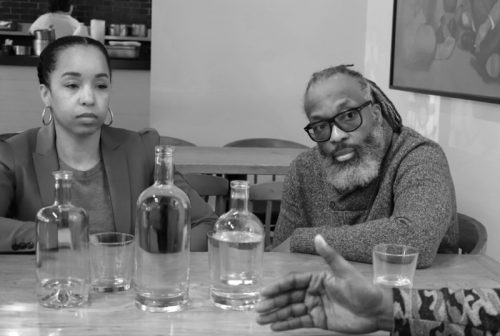
I don’t believe in “if you build it, they will come.” It takes a lot more than that as a business, but it also takes, on the side of the proprietor, seeing some people that actually, sincerely believe in you. That they’re not just stopping by. That’s what happens in the white community, in the Hispanic community, in any of the European communities. African-Americans will come by and critique the hell out of you. We will critique you until there’s no more critiquing left. We are the most demanding community. Like, we don’t want the ice cream sundae with the sundae toppings. We want to know why you don’t have the remix of the sundae toppings.
(Laughter)
Because it’s a sundae, that’s why I don’t got the remix of the sundae toppings. You ain’t spent enough money for me to buy the extra damn ingredients. And we want the remix for free! “You know it’s my mama’s birthday!”
ROME: “Just so we clear. Just so we clear.”
WILLIAMS: And that’s a lot. To have the burden of rent, the burden of understanding, how to operate, navigate in these choppy waters, the burden of staffing, and then turn around and not get the support. That creates a huge challenge. Fortunately, you talked to four people that believe they’re the right people for the job. That we are superheroes.
Michael Gebert is editor of Fooditor.
Latest
Join the Discussion
After you comment, click Post. If you're not already logged in you will be asked to log in or register with Disqus.



